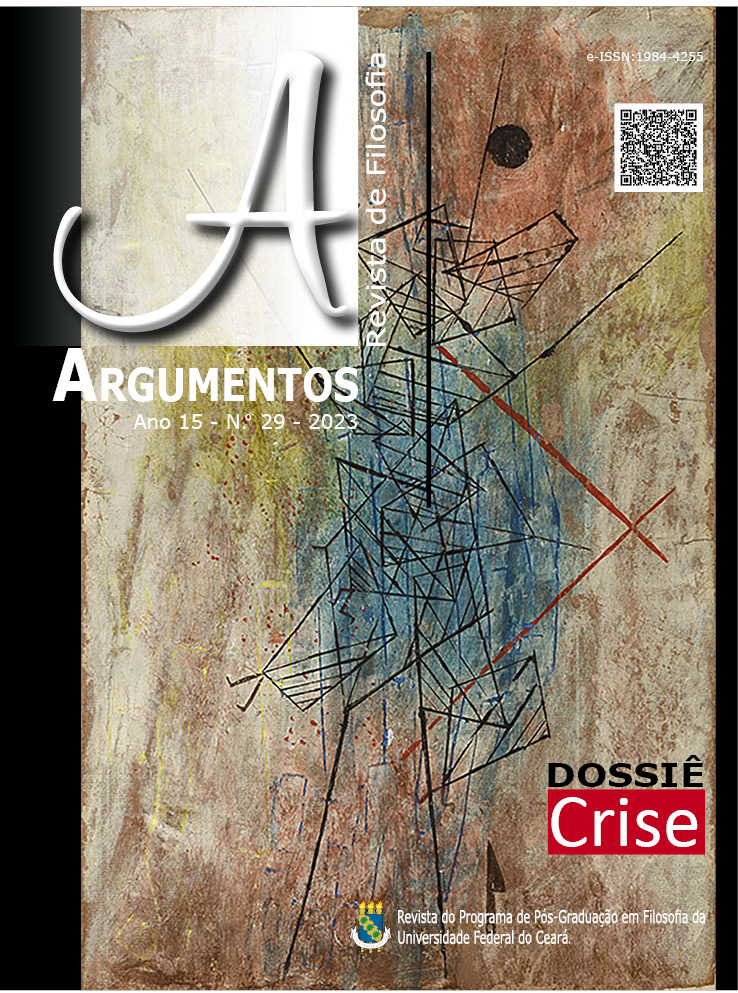Deleuze and two appropriations of the nietzschean dionysian for a thought without a subject
DOI:
https://doi.org/10.36517/Argumentos.29.18Keywords:
Deleuze. Nietzsche. Dionysian. Thought.Abstract
The aim of this article is to highlight and discuss two moments in which Deleuze appropriates the Nietzschean notion of Dionysian, to compose the program of a thought without image in opposition to the thought of representation.The first appropriation concerns the question of a new philosophical discourse in favor of individuations and singularities prior to the “subject form”. The second appropriation corresponds to the defense of an immanent thought, which occurs on the surface and does not resort to well-centered models. It is about verifying at which points Nietzsche's influence was decisive for Deleuze to compose a new thought in Difference and Repetition, highlighting the notions of individuation, singularity, difference and art.
References
BENOIT, Blaise. “Nietzsche e a metafísica do sujeito: por um “si corporal?”. In: MARTINS, André; SANTIAGO, Homero; OLIVA, Luis César (Org.). As ilusões do eu: Spinoza e Nietzsche. Rio de Janeiro: Civilização Brasileira, 2001.
BLANCHOT, Maurice. O espaço literário. Trad. Álvaro Cabral. Rio de Janeiro: Rocco, 2011.
BUYDENS, Myreille. Sahara; L’esthétique de Gilles Deleuze. Paris: Vrins, 1990.
DELEUZE, Gilles. A ilha deserta e outros textos. Trad. Luiz Orlandi et. al. São Paulo: Iluminuras, 2006.
DELEUZE, Gilles. Crítica e clínica. Trad. Peter Pál Pelbart. São Paulo: Editora 34, 1997 (3ª reimpressão - 2008).
DELEUZE, Gilles. Diferença e repetição. Trad. Roberto Machado. Rio de Janeiro; São Paulo: Paz e Terra; Graal, 2018.
DELEUZE, Gilles. Dois regimes de loucos. Textos e entrevistas. Trad. Guilherme Ivo. São Paulo: Editora 34, 2016.
DELEUZE, Gilles. Foucault. Trad. Cláudia Sant’Anna Martins. Revisão da tradução de Renato Ribeiro. São Paulo: Brasiliense: 2005.
DELEUZE, Gilles. Lógica do sentido. Trad. Luiz Roberto Salinas Fortes. São Paulo: Perspectiva, 2007.
DELEUZE, Gilles. Nietzsche e a filosofia. Trad. Mariana de Toledo Barbosa e Ovídio de Abreu Filho. São Paulo: n-1 Edições, 2018a.
DELEUZE, Gilles.; GUATTARI, Félix. O que é a filosofia? 2ª ed. Tr. Bento Prado Jr.; Alberto A. Muñoz. Rio de Janeiro: Editora 34, 1997.
MATOS, Leandro Lélis. Estética e dessubjetivação em Deleuze. 2021. 360f. Tese (Doutorado em Estética e Filosofia da arte). Universidade Federal de Minas Gerais, Belo Horizonte.
NIETZSCHE, Friedrich. Genealogia da Moral: uma polêmica. Trad. Paulo Cézar de Souza. São Paulo: Companhia das Letras, 2015.
NIETZSCHE, Friedrich. O nascimento da tragédia ou helenismo e pessimismo. Trad. J. Ginsburg. São Paulo: Companhia das Letras, 2007.
RIMBAUD, Arthur. Oeuvres completes. Paris: Gallimard, 1972. (Col. Bibliothèque de la Plêiade).
SANTOS, Laymert Garcia dos. “Rumo a uma nova terra”. Revista Ecopolítica. São Paulo, n. 5, jan./abr., 2013.
SILVA, Cintia Vieira da. Corpo e pensamento – alianças conceituais entre Deleuze e Espinosa. Campinas: UNICAMP, 2013.
SILVA, Cíntia Vieira da. Pintura e cinema em Deleuze: do pensamento sem imagem às imagens não representativas. Artefilosofia, Ouro Preto, n. 10, abr./2011, p. 81-88.
WOTLING, Patrick. “Uma genealogia às avessas. A metafísica da subjetividade e a metafísica como subjetividade”. In: MARTINS, André; SANTIAGO, Homero; OLIVA, Luis César (Org.). As ilusões do eu: Spinoza e Nietzsche. Rio de Janeiro: Civilização Brasileira, 2001.
Downloads
Published
Issue
Section
License
Argumentos magazine is licensed under an International Creative Commons Attribution License.
The Magazine uses CC BY inclusion
1) The authors retain the copyright granted to the magazine or the right to initial publication, with the work regularly licensed under the Creative Commons Attribution, which allows the sharing of the work with acknowledgment of authorship and initial publication in this magazine.
2) The authors are authorized to contract additional applicable contracts, for non-exclusive distribution of the version of the work published in this journal (for example, publication in the institutional repository or as a chapter of the book), recognition of authorship and initial publication in this journal.
3) Authors are authorized and encourage to publish and distribute their work online (for example, in institutional repositories or on their personal pages) at any time before or during the editorial process, as they can generate productive changes, as well as increase the impact and reference of published work.




.jpg)










._._3.png)
1.jpg)
._._._.png)
